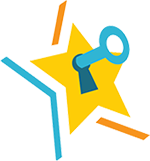21st Century Skills Micro-credentials
Education Design Labs
21st Century Skills Micro-credentials builds essential skills through an online learning experience, available as a framework and materials or as ready-to-use courses with the option to earn competency badges.
What This Includes
Skills addressed: Collaboration, Creative Problem Solving, Critical Thinking, Empathy, Initiative, Intercultural Fluency, Oral Communication, Resilience
Toolkit option
- Designed for those who want to develop their own courses based on the framework
- Each competency includes activities, videos, and articles to teach the sub-competencies
- Assessments for each sub-competency can be purchased separately
Plug-and-play option
- Designed for institutions which have their own Learning Management System (LMS) and can manage learner registration and learning progress
- Fully developed modules can be integrated with an existing LMS, such as Blackboard, Canvas, D2L, and Moodle
- Facilitator’s guide has directions, videos, tips, FAQs, and use cases of how institutions are implementing badges
- Includes training for instructors on course implementation and badging
Hosted option
- Ideal for those who don’t have an LMS and want full technical assistance and support
- Fully developed modules for each competency
- Facilitator’s guide has directions, videos, tips, FAQs, and use cases illustrating how institutions are implementing badges
- Includes training for instructors on administering micro-credentials and badging
Key Takeaways
- The toolkit option requires registration and a signed agreement but has no paid subscription. Access to assessments and badging support are not included.
- For the plug-and-play and hosted models, learners can earn a micro-credential by demonstrating proficiency via performance-based assessments (called “proving grounds”) that can be attached to badges to show evidence of competencies.
- In order to be able to issue the Lab’s 21st Century Skills Micro-credentials badges, program instructors or administrators must complete the self-paced, online four- to six-hour facilitator training.
- Badges are co-designed with employers to mirror real-world experience, demonstrating learner ability to activate the skills in workplace-based scenarios.
- Dashboard analytics on the plug-and-play and hosted models allow facilitators to track learner engagement, progress, and other metrics.
In 2015, Education Design Lab brought together employer and education stakeholders to see if they could capture learning in a way that was useful to employers. The Lab developed the badging toolkit, which seven universities tested and reviewed. Currently, more than 800 higher education institutions and 125 K–12 districts are using the resources developed through this initial initiative. More recently, the Lab released a second version of the original toolkit through vsbl, which gives institutions three options for implementation. The original toolkit is still available through the vsbl platform. The badging credentials are currently being used in some 40 pilots worldwide and are implemented in a variety of models.
Tags: Communication, Critical & Creative Thinking, Emotional Intelligence, Leadership & Initiative, Respecting Differences, Teamwork & Collaboration, Assessment Tool, Credentialing & Badging, Instructional Material, Audio / Video, Online, Free (Registration Required), Payment Required, Adult Education, Higher Education, Workforce Development
Communication
Critical & Creative Thinking
Emotional Intelligence
Leadership & Initiative
Respecting Differences
Teamwork & Collaboration
Search Again
 Have a resource to suggest?
Have a resource to suggest?
Share it with us.